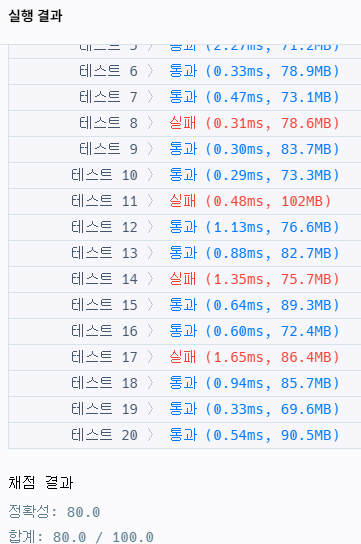📝 133499 옹알이(2)
https://school.programmers.co.kr/learn/courses/30/lessons/133499
1. 문제 요약
- 문자열이 "aya", "ye", "woo", "ma" 네 가지 발음으로만 이루어져 있고, 같은 발음을 연속해서 쓰면 안 된다
2. 접근방법
- words 배열 선언하고 가능한 발음 넣어두기
- 각 문자열 b에 대해 처음부터 차례대로 확인하기
- startsWith(w, i) 써서 현재 위치에서 가능한 발음이 시작되는지 확인하기
- 같은 발음이 직전에 사용된 것(prev)와 같으면 건너뛰기
- 끝까지 조건을 만족하면 유효한 단어로 카운트
3. 정답코드
class Solution {
public int solution(String[] babbling) {
String[] words = {"aya", "ye", "woo", "ma"};
int count = 0;
for (String b : babbling) {
String prev = ""; // 이전 발음을 저장해서 연속 확인
boolean valid = true; // 처음에는 유효하다고 가정하고 시작
int i = 0;
while (i < b.length()) {
boolean matched = false;
for (String w : words) {
// b라는 문자열이 i번째 인덱스부터 시작해서 w라는 문자열로 시작하는지 확인하는 메서드
if (b.startsWith(w, i) && !w.equals(prev)) {
prev = w;
i += w.length();
matched = true;
break;
}
}
// 네 가지 발음 중 하나도 매칭 안 되면 유효하지 않음
if (!matched) {
valid = false;
break;
}
}
// 끝까지 조건을 만족했다면 count++
if (valid) count++;
}
return count;
}
}4. 정규식으로 푸는 법
import java.util.regex.*;
class Solution {
public int solution(String[] babbling) {
String[] words = {"aya", "ye", "woo", "ma"};
int count = 0;
String pattern = "^(aya|ye|woo|ma)(?!\\1)(aya|ye|woo|ma)*(?!\\1)$";
Pattern regex = Pattern.compile(pattern);
for (String b : babbling) {
Matcher matcher = regex.matcher(b);
if (matcher.matches()) {
count++;
}
}
return count;
}
}정규식만으로 풀려고 하면 상당히 복잡해진다. 정규식으로는 "허용단어만 포함"까지만 검사하고, 연속된 단어를 금지하는 조건은 따로 로직으로 처리하는게 깔끔하다.
import java.util.regex.*;
class Solution {
public int solution(String[] babbling) {
int count = 0;
// 허용된 단어로만 구성된 경우
String validPattern = "^(aya|ye|woo|ma)+$";
// 같은 단어가 연속되는 경우 걸러내기
String invalidPattern = "(ayaaya|yeye|woowoo|mama)";
Pattern valid = Pattern.compile(validPattern);
Pattern invalid = Pattern.compile(invalidPattern);
for (String b : babbling) {
if (valid.matcher(b).matches() && !invalid.matcher(b).find()) {
count++;
}
}
return count;
}
}1. "^(aya|ye|woo|ma)+$"
문자열 전체가 aya, ye, woo, ma 중 하나 이상으로만 구성되어야 한다는 뜻이다.
^(aya|ye|woo|ma)+$1. ^
- 문자열의 시작
"abc"문자열에서^a라고 하면 a로 시작해야 한다는 뜻이다.
2. (aya | ye | woo | ma)
- 괄호 안의 여러 선택지 중 하나
aya또는ye또는woo또는ma중 하나가 매치된다.
3. +
- 바로 앞의 패턴이 한 번 이상 반복될 수 있다는 의미이다.
- 예를 들어,
aya,yayaya,wooma, 이런 식으로 계속 이어져도 된다. - 단, 빈 문자열은 안 됨 (그럴 경우는
*써야 함)
4. $
- 문자열의 끝을 의미한다.
"^...$"패턴은 문자열 전체가 정확히 규칙에 맞아야 매치됨을 뜻한다.
2. 정규식 객체 생성
Pattern regex = Pattern.compile(validPattern);이건 정규식 문자열을 재사용 가능한 Pattern 객체로 만드는 과정이다.
- Pattern
- java.util.regex.Pattern 클래스
- 정규식을 객체화해서 여러 번 사용할 수 있게 만들어준다
- 문자열에서 반복적으로 정규식 매칭을 하고 싶을 때 편리하다.
- compile(String regex)
- 정규식 문자열을 Pattern 객체로 변환한다.
- 예를 들어, 아래처럼 하면 pattern 안에 정규식이 들어 있고, 문자열 검사할 준비가 된 것이다.
String validPattern = "^(aya|ye|woo|ma)+$";
Pattern pattern = Pattern.compile(validPattern);3. Matcher 와 함께 사용한다.
for (String b : babbling) {
// 만약 b가 허용된 단어로만 이루어져 있고, 연속된 단어가 없으면, 카운트를 1 올린다.
if (valid.matcher(b).matches() && !invalid.matcher(b).find()) {
count++;
}
}- 전체 문자열이 valid 패턴과 일치하고, 연속 반복 금지 단어는 없으면 → count 증가
matches()→ 전체 문자열 체크find()→ 부분 문자열 체크!invalid.matcher(b).find()→ 반복 단어가 없음을 확인하는 부분이다.
1. valid.matcher(b).matches()
- b 문자열이 허용된 단어("aya", "ye", "woo", "ma")만으로 이루어져 있는지 확인
- 문자열 전체가 패턴과 완전히 일치하면 true
- 한글로 읽으면 "만약 b가 aya, ye, woo, ma 단어들로만 이루어져 있다면"
2. invalid.matcher(b).find()
- b 안에 "ayaaya", "yeye", "woowoo", "mama" 와 같은 단어 반복이 있는지 확인
- find()는 부분 문자열 검사
- !를 붙이면 반복 단어가 없으면 true
- 한글로 읽어보면 "b안에 같은 단어가 연속으로 나오지 않는다면"
3. &&이므로 위 1,2 두 조건 모두 만족하면 if문이 실행된다.

